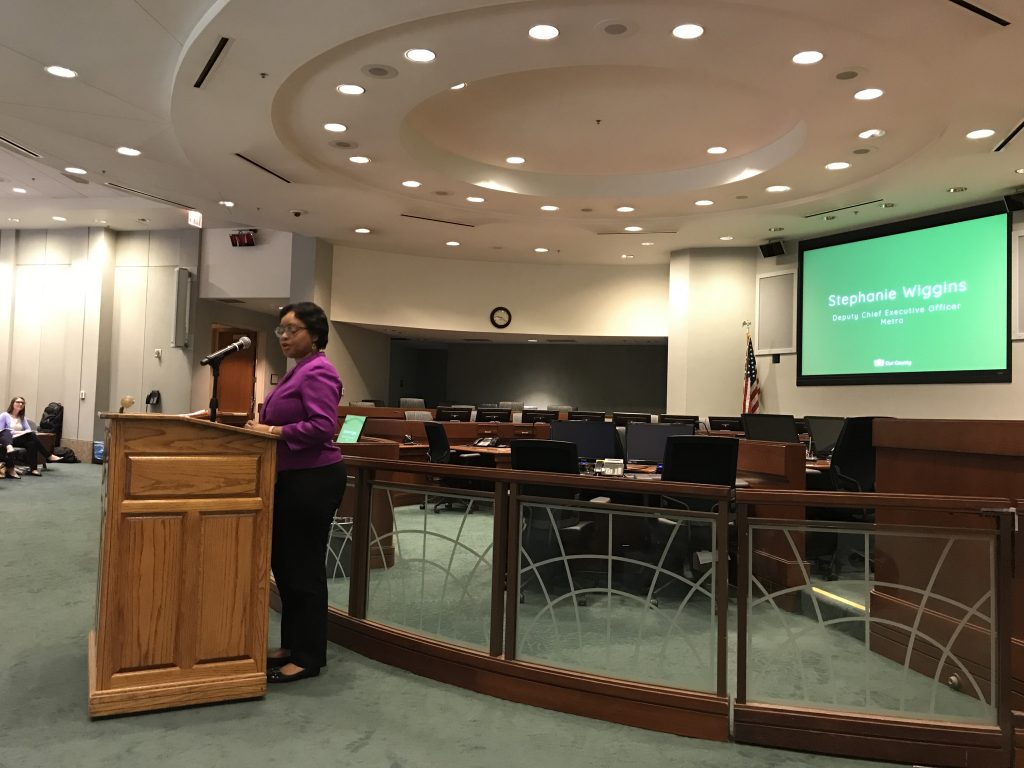UCLA convened public and private sector leaders across Los Angeles County to provide input on the transportation system in L.A. County and their intersections with land use, housing, climate adaptation, and other cross-cutting sustainability topics.

The “Transportation and People” workshop, held on September 26, 2018 at Metro Headquarters, convened over 70 attendees representing 54 public agencies, private sector entities, and transportation providers.
The L.A. County Chief Sustainability Office began the workshop by providing an overview of the Our County plan development process. Stephanie Wiggins, the Deputy Chief Executive Office at Metro, welcomed participants to Metro Headquarters and shared the agency’s own regional planning measures. UCLA followed with a presentation covering key background information, data, and regional findings related to transportation infrastructure, regional mobility, transit accessibility, countywide transportation planning efforts, and emerging technology and companies. Stakeholders in the room all received an accompanying briefing document outlining the information in UCLA’s presentation.
After the group presentations, workshop participants met in breakout groups to provide feedback on general Transportation goals that were included in the briefing and framed the discussion. The second breakout session featured a series of prompts evoking cross-cutting sustainability themes. The final breakout session had each attendee from the public sector pair off with an attendee from the private sector. The public-private pair developed a concept for a Transportation-focused public-private partnership opportunity relating to one of the prompts.
Key Takeaways
- Stakeholders expressed concern that the goals and strategies should more clearly support reducing the amount of time, distance, and emissions caused by the overwhelming use of private vehicles. Though stakeholders had differing opinions on the degree to which low occupancy vehicles should be supported in the region, nearly all agreed that L.A. County should incorporate language into the plan that specifically calls for decreasing vehicle miles traveled (VMT) and better prioritizing public transportation on existing roadways and through new infrastructure.
- During the strategies discussion, stakeholders focused on the relationship between transportation and public health, recognizing that public health is a key area where L.A. County has direct control. Participants linked a wide range of transportation issues to public health, including pedestrian and bicyclist safety; air quality; accessibility to health and education services; and supportive services for vulnerable transit riders. However, stakeholders had much less feedback to offer when prompted to address the corresponding goal (“Improve transportation-related health and safety outcomes”). The goal language may benefit from explicitly wording key issues that “health and safety outcomes” encompass.
- Participants want to see L.A. County increase its focus on the role that transportation can play to boost the regional economy and create workforce development opportunities. Stakeholders shared a variety of strategies about how the County can achieve this. Many discussed incentivizing housing and jobs along existing transportation corridors. Others felt that the transportation industry at large should bring more jobs to local communities through local hire and equitable project labor agreements.
- Some comments stakeholders shared – particularly stakeholders in the electric vehicle industry – suggested that the workshop discussion on vehicle electrification did not match the current emphasis and complexity of the issue in the region. Despite the fact that there was a prompt focused on the nexus between energy and transportation, stakeholders did not develop many strategies around vehicle electrification. Relatedly, many felt that the goal of decarbonization of freight corridors was actually a strategy to reduce energy consumption, air pollution and carbon emissions overall.
- Public and private sector stakeholders agreed on the need for robust public engagement when it comes to transportation projects, programs, and policies. Though several comments were made about better involving communities in the planning process, the majority of feedback focused on public education and mobility literacy. The message is that stakeholders want to see programs that educate residents about transportation options and make it easier for them to adopt new behaviors around transportation use.
Comments on the key recommendations can be directed to sustainability@lacounty.gov.
Read more in the Transportation Public Private Workshop Summary
Download the Transportation Public Private Workshop Notes
Download the Transportation Public Private Workshop Presentation
Download the Our County Transportation Briefing
